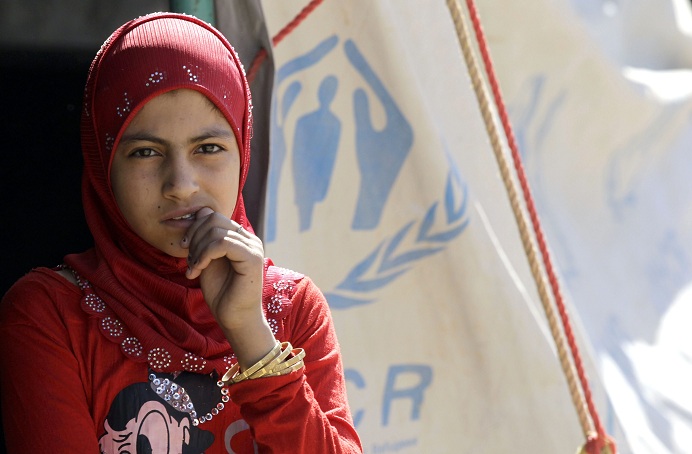International Women’s Day is an occasion to reflect on the indispensable role played by women in every community and nation. It is a time to recognize and celebrate the distinctive contribution women everywhere make to the well-being, cohesion and advancement of human society. The unique place of women assumes the greatest significance in times of stress and emergency.
In my years of working with refugees on every continent, I have witnessed time and time again how societies in crisis rely for their survivial and recovery on the innate strength, resilience and creativity of women.
Regardless of how dire the calamity, wherever there are grandmothers, mothers, sisters, aunts there is always a solid, even if unpsoken, conviction that the desperate times will be withstood and normalcy will one day return.
My work with Palestine refugees in Jordan, Syria, Lebanon, Gaza and the West Bank has affirmed my respect for the role women play as custodians of strength, survival and renewal for communities under stress. Women are the bedrock of Palestine refugee communities, serving as a potent force for family and societal cohesion. Now more than ever, women are weaving the threads that form the social fabric of their community, by pursuing new opportunities in education and employment, advancing their civil rights and carving out a stronger and fairer role for themselves within Palestinian society. As the UN marks International Women’s Day and launches a campaign to end violence against women world-wide, it is especialy important that international standards of equality, non-discrimination, equal opportunity and protection for women are reflected in concrete ways throughout Palestinian communities. The global statistics are shocking: according to UN estimates, at least one out of every three women in the world is likely to be beaten, coerced into sex or otherwise abused in her lifetime. Palestine refugee women should not have to suffer such abuse in their homes and places of work in addition to the travails of their 60-year exile and the brutal hardships of the occupation in the West Bank and Gaza. In Gaza, where women face fresh challenges from within their own, now increasingly conservative society, there is a resounding desire for positive change and an unshakeable will to make change happen. UNRWA’s “Equality in Action program is designed to support and assist Palestinian and Palestine refugee women to realize their wish for empowerment, equality, and dignity and freedom, that is, freedom from violence and abuse as well as freedom to express themselves and to achieve their dreams. Under the Equality in Action Program, UNRWA, along with our NGO partners provides refugee women with opportunities in education, training, and micro-enterprise, thus helping to broaden their horizons and enhance their potential for gainful employment. There are now programs to foster constructive debate in the community about the costs of the internal factional conflict and the role of women in resolving it. Through such activities, and the work of women groups and women program centers in the refugee communities in Jordan, Syria, Lebanon and the occupied Palestinian territory, women are making strides towards building strong and inclusive communities; communities where values are shared, inequalities minimized and traditional gender-roles re-oriented for the good of the society. We seek to nurture the organization of women’s groups at the grassroots to help them achieve true equality in decision-making at the highest levels. Groups such as the General Union of Palestinian Women (the umbrella organisation for female representatives in the PLO) ensure a female presence in the political sphere through which the needs and rights of women and girls can be heard and addressed. Women are now well-placed to play a critical role in bringing about legislative changes, whether pertaining to electoral law, legal rights or workplace regulations. I applaud this and welcome their achievement. Traditionally, the burden of finding ways to feed, clothe and educate their children falls on women and as unemployment levels rise across the occupied Palestinian territory, women are making sacrifices to provide for their families. Mothers go hungry so that their children do not. Within the family, women nurture the emotional, social, intellectual, and personal development of their children: they inculcate social values in children, the values that form civil society. Where decision-making lies with men, mothers often advocate for their daughters – to receive formal education, to go to university, to work outside the home. The value of female education is recognized among Palestinians, and the results can be seen in figures: across the West Bank, thousands of young women are enrolled in university courses, intending to use their qualifications to pursue careers that previously were the domain of men. Yet what could be achieved if the situation were different? If women were never prevented from travelling to class; if the electricity on which focus groups rely were not so intermittent; if social attitudes progressed further towards equality and justice for women; if resources for these initiatives were plentiful?
Peace, human rights that are respected and meaningful development all require the active presence of women. It is impossible to separate the struggle to end the oppression of the Palestinian people from the struggle for equal rights for all segments of their society. Both struggles call for a monumental effort on the part of everyone – men and women alike, working together to overcome the impediments that are inherent in the realities of refugee life. But it is an effort that is being met nonetheless by Palestinian women everywhere with courage, determination, and an ever-increasing degree of success. Karen Abuzayd is the Commissioner General of the United Nations Relief and Works Agency.

